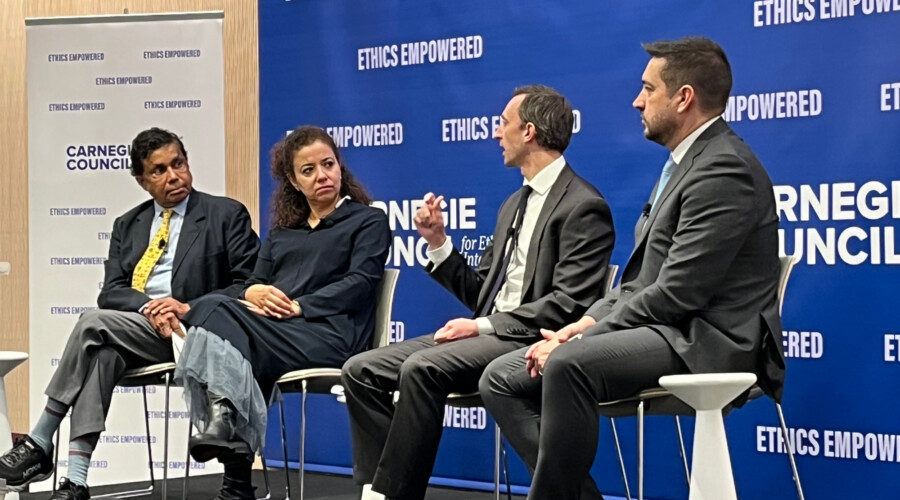This article first appeared on February 13 in The Christian Science Monitor. Posted with kind permission.
The past few months have not been kind to foreign nationals looking to promote democracy in Egypt. Despite the Arab Spring, post-Mubarak authorities have been slow to embrace the onslaught of aid that invariably follows "democratic" revolution.
In fact, they have been outright hostile. Earlier this month, 43 aid workers (including at least 16 Americans) were reportedly charged with channeling funds to Egyptian nonprofit groups—an act that, while technically illegal, was tacitly condoned under the Mubarak government. At the center of the political storm are the American "party institutes"—the National Democratic Institute (NDI) and the International Republican Institute (IRI).
The outrage from these organizations, the U.S., and Europe is understandable and well deserved. But it also speaks to a little acknowledged paradox: For all their good intentions, these organizations are conducting work that would never be tolerated in the U.S. and Western Europe. Foreign support for political parties and electoral campaigns would enrage millions of Americans.
The charges against these groups came on the heels of the months-long persecution of Egypt’s democracy promotion community that began this past December, when the offices of 17 foreign nongovernmental organizations were raided by Egyptian security forces. In the weeks since, Egyptian officials have played it coy. First implying that the NGO shutdowns were a mere misunderstanding, they have since refused to grant them legal permission to operate, and have orchestrated a media attack resembling a witch-hunt.
Understandably, these groups are incensed by Egypt's latest moves. So are foreign dignitaries. The past few days have witnessed a litany of indignant statements issued by, among others, Secretary of State Hillary Rodham Clinton, the European Union's foreign policy chief Catherine Ashton, and even The New York Times. Tensions have mounted so fast and furiously that some even suggest that the 30-year old alliance between Egypt and the United States hangs in the balance.
But should Washington really be surprised? Just consider how the mere allegation of foreign interference in U.S. campaigns has been greeted: In 1996, rumors that Chinese authorities were covertly financing the Democratic National Committee caused a national uproar, culminating in a series of high-profile congressional investigations and 22 convictions of fraud. And when in 2003 allegations surfaced that Swedes and Canadians were contributing money to MoveOn.org, foreigners were accused of plotting to undermine George W. Bush's re-election. Within days, MoveOn took steps to ban foreign contributions.
Indeed, many democracies have some form of legislation forbidding foreigners from making financial or material donations to domestic political parties. Given their potential to influence and thus, obstruct the will of the people, such donations are believed to be at odds with the democratic process.
Yet in more than 100 countries, the party institutes come close to doing precisely that: They offer training, strategic campaign advice, material assistance, and in rare instances, financial support to political parties with the express purpose of influencing their work and conduct.
To their credit, they have often done important work: They've helped build anti-authoritarian political coalitions, trained tens of thousands of election monitors, and worked to promote the role of women and youth within political parties. All of this is sorely needed in non-democratic and newly democratic contexts. But it doesn't negate the fact that these foreign organizations are interfering with other countries' electoral processes in ways that Americans would be reluctant to accept back at home.
Of course, these organizations argue that their assistance is nonpartisan and nongovernmental. Both claims are only partially true, however.
Let's take their assertions of nonpartisanship. Both NDI and IRI say they don't pick sides, yet their work in places like Serbia, Georgia, and Ukraine has been credited with toppling dictators. They say that they don't provide financial assistance. But they admit to having paid for parties' rent, computers, and even campaign commercials. Precisely because of the highly partisan nature of these interventions, countries like Belarus and Russia have long engaged in a "backlash against democracy promotion."
And are they really nongovernmental? Although these organizations call themselves NGOs, the reality is far more ambiguous. Both NDI and IRI receive the great bulk of their funding from government sources. Their boards are run by current and former US government operatives and party professionals. In the field, their resident directors often have little choice but to toe the State Department line. Ultimately, the Institutes are—like all forms of foreign aid—instruments of U.S. foreign policy.
And let us not forget the dubious record of this policy in Egypt. For 30 years, U.S. aid to Egypt was bent on bolstering the Mubarak regime. For 30 years, America funded its dictatorship, and supported its military. Surely, Egyptians can't be blamed for questioning the integrity of America’s commitment to their democracy. Indeed, whatever the ultimate outcome of the current aid debacle, it will take much more than $1.5 billion in aid to alter the legacy of America's decades-long support for Egypt’s autocracy.
This does not excuse the actions of Egyptian authorities. What they have done—and continue to do—is wrong. But Washington shouldn't be surprised. After all, as instruments of foreign policy, party institutes are charged not only with promoting democracy, but also with promoting foreign interests. This would and should raise questions everywhere. It certainly would in our own backyard.




